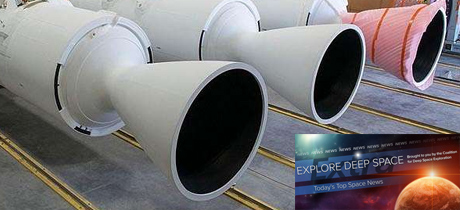In Today’s Deep Space Extra… A National Space Council report calls for an all of government approach to the future human exploration of space. Russia’s space agency chief says Russian will work with China on lunar research and exploration. The U.S. Space Command expressed alarm over potentially hostile Russian satellite activities earlier this month.
Space Policy
Space Council’s Moon to Mars development strategy
Spacepolicyonline.com (7/23): A National Space Council report released Thursday calls for an all of government approach that makes NASA’s Artemis initiative for the return of human explorers to the surface of the Moon a first step leading to a permanent human movement into the solar system. Scott Pace, deputy assistant to President Trump, led the effort by the council’s staff and its 28 member Users’ Advisory Group to develop the report.
Democrats say they support Moon mission for NASA
Huntsville Times (7/23): A draft of the Democratic Party’s campaign platform expresses support for NASA’s plans to return to the surface of the Moon with human explorers and to prepare to move on to Mars. The language also offers continued support for the International Space Station (ISS), which will mark 20 years of a continuous human presence in November. The ISS serves as a test bed for deep space exploration technologies. The platform awaits adoption by those participating in the Democratic National Convention (DNC) leading to the November presidential election.
Human Space Exploration
Russia and China likely to build joint Moon base – Roscosmos chief
TASS of Russia (7/23): Dmitry Rogozin, the head of Russia’s space agency Roscosmos, says Russia and China will likely work together on lunar research and to establish a research base on the Moon. [Editor’s Note: Tass is a media outlet owned by the Russian government.]
NASA safety panel has lingering doubts about Boeing Starliner quality control
Coalition Member in the News – Boeing
SpaceNews.com (7/23): NASA’s independent Aerospace Safety Advisory Panel’s (ASAP) third quarter virtual meeting on Thursday included an expression of concerns for Boeing’s efforts to achieve Commercial Crew Program certification for the CST-100 Starliner to begin regular transportation of astronauts to and from the International Space Station (ISS). An uncrewed test flight in December experienced an assortment of flight software issues, prompting plans for a reflight. However, the nine-member ASAP panel urged NASA to exercise continued diligence as plans for a repeat of the test flight progress.
Progress supply ship docks with Space Station after last-minute misalignment
Spaceflightnow.com (7/23): Russia’s Progress MS-15 cargo capsule overcame a last moment automated guidance system concern Thursday to complete a two orbit/three hour, 19 minute launch to docking with the Russian segment of the International Space Station (ISS). The Progress delivered 5.600 pounds of propellant, crew supplies, ISS hardware and science research materials to the five person orbiting science lab at 1:45 p.m., EDT.
Space Science
NASA is prepared for the risks of launching nuclear-powered rover
Coalition Member in the News – United Launch Alliance
Florida Today (7/23): NASA’s Perseverance Mars 2020 Rover, due to launch on July 30, has been equipped with nearly 11 pounds of radioactive plutonium dioxide as its electrical power and heat source. Should there be a launch accident, there is but a 1 in 1,100 chance of a leak of the radioactive material close to the launch site, according to the NASA official who led a risk assessment. NASA selected the United Launch Alliance (ULA) Atlas V rocket for the mission based on performance and reliability.
NASA’s next rover will bring first-ever microphone to Mars
Futurism (7/23): Awaiting a July 30 launch from Cape Canaveral Air Force Station, Florida, NASA’s Perseverance Mars 2020 rover has a bold agenda once it reaches the Martian surface in February 2020. One small but significant objective is to listen to the sounds of Mars, a first. Over a two year mission, Perseverance is to gather samples of rock and soil for eventual return to Earth, also a first.
Other News
U.S. accuses Russia of testing anti-satellite weapon in space
Associated Press via PBS (7/23): The U.S. Space Command announced Thursday that Russia carried out an anti-satellite exercise on July 15 that appears to have involved an inspector satellite demonstration. The U.S. Department of State and experts outside of the government are expressing alarm over recent actions by China as well as Russia to weaponize low Earth orbit.
Northrop Grumman delivers three GEM 63 rocket motors for Atlas V
Coalition Members in the News – Northrop Grumman, United Launch Alliance
Space Daily (7/23): Northrop Grumman has delivered three of its 63-inch-diameter Graphite Epoxy Motors (GEM 63) for United Launch Alliance’s (ULA) Atlas V rocket. The three motors were shipped from the Northrop Grumman facility in Magna to Cape Canaveral Air Force Station in Florida, and will be used as strap-on boosters to augment thrust on Atlas V. The GEM 63 rocket motors were developed under a cooperative agreement with ULA for the Atlas V vehicle. Each motor contributes a maximum thrust of 373,000 pounds to the launch with up to five GEM 63 motors being able to support a single Atlas V launch.

